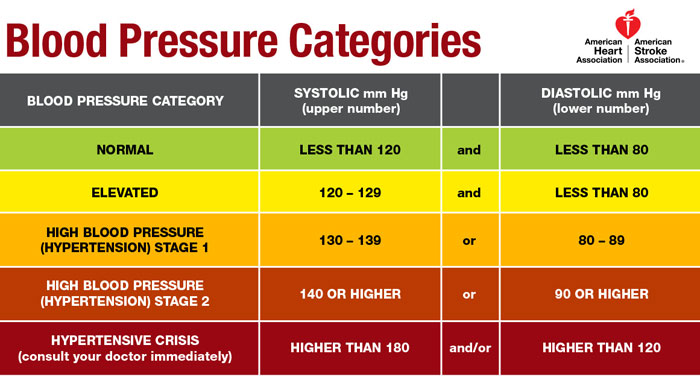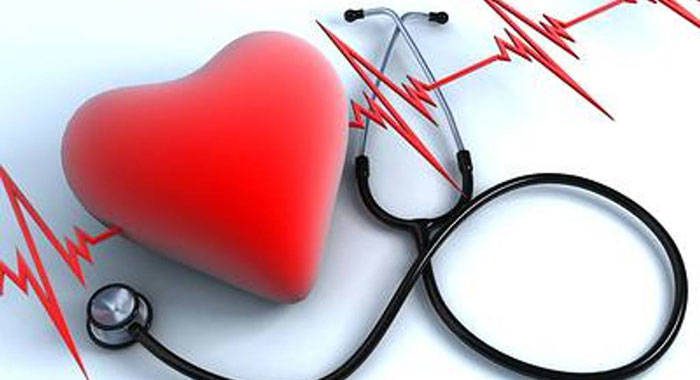By Pauline Garbedian-DeFreitas
Managing Director, Health Solutions Inc.
On Nov. 13, 2017, the American Heart Association announced the first major new blood pressure guidelines with approximately 106 recommendations. (See graphic below).
This is the first extensive update in over a decade, which was announced after careful review by numerous health care professions and organisations.
The new guidelines have eliminated the previous “prehypertension” category and have now added the “Elevated” category. They have advances the previous “Stage 1 hypertension” to now being a “Stage 2” hypertension. Lastly, the new guideline for being diagnosed with hypertension is a reading of 130/80 or higher compared to the previous guideline reading of 140/90 or higher.
What is blood pressure and how is it measured?
Blood pressure is the force of blood pushing against the walls of the arteries as the heart pumps blood. Blood pressure is read with two numerical readings in a fraction-like equation.
The top number is the Systolic Pressure, which is when the heart beats while pumping blood against the arteries. This is the highest level the blood pressure reaches when the heart beats.
The bottom number is Diastolic Pressure, which is the lowest level your blood reaches as your heart relaxes in between beats.
 Blood pressure generally changes based on our activity such as when we are sleeping, when we wake up, are stressed, anxious or excited. For high blood pressure to be diagnosed it must be done by a health care professional, the readings must be assessed at rest two to three times and on different days. Based on the assessment results, your health care professional may diagnose you with Hypertension.
Blood pressure generally changes based on our activity such as when we are sleeping, when we wake up, are stressed, anxious or excited. For high blood pressure to be diagnosed it must be done by a health care professional, the readings must be assessed at rest two to three times and on different days. Based on the assessment results, your health care professional may diagnose you with Hypertension.
Once diagnosed your health care professional will confirm if your hypertension is a primary disease or secondary due to possible underlying medical issue such as kidney related issues, thyroid problems, blood vessel defects, certain medication use etc. Further testing is recommended to rule out any organ damage as hypertension in many instances is a silent illness and many may have it without exhibiting any symptoms.
Based on the overall assessment findings your health care professional will then determine what the best regime for your treatment will be. Patients need to keep in mind they too must be accountable for their health through required healthier lifestyle changes, being medically complaint and ensure they have appropriate follow-ups. Medication alone will not manage hypertension.
The new guidelines with no doubt increase the population numbers around the world of people being diagnosed with hypertension. The hope for the new blood pressure guidelines is to have people begin thinking about their health, bring attention to the population to know their blood pressure, understand the possible cause(s), use effective strategies to reduce blood pressure which does not always have to involve medication, implement healthier lifestyles and treat hypertension more aggressively when needed to reduce life-threatening heart attacks, strokes and prevent hypertension-related illnesses such as chronic kidney disease.







Did you notice that is not much mentioned or focused on or about how a patient can use preventative measures to prevent and combat hypertension. There is a reason for this.
You are right in saying that medicine alone will not adequately manage and control and here lies the question as to why about hypertension.
People need all of the facts in order to improve health status!
What you eat and how much are significant in controlling hypertension. Also, other mitigating conditions include diabetes, high cholesterol and renal conditions. We need to be taught to look at the whole picture. However, often what we are offered are segment which are geared significantly towards certain goals.
It would be more significant when the focus is placed on nutritional therapy, nutritional knowledge and care rather than drugs. Here at home we need to focus on what we have locally that we can consume and educate communities about using our local produce and products for our health benefits as they are mostly organic, less polluted and not overly processed and filled with preservatives.
This is to make the drug companies rake in billions.
You are absolutely right Observer! It is all about the money. This new definition is so that more people rush out and buy medicine to make the Pharmaceutical Industry more money. It is very sad that money is more important to these powerful industries than health. As we all know much of the USA is already on anti-depressants. They would spread medications to everyone in the world if they could.
Do not be afraid to question your doctor about your concerns, If they are concerned about supplying good patient care, they would not object or take offense to you asking about your care. The days of trust me because I know what is best for you are long past. They should explain to you about your care and your responsibility as a patient to be an active participant, not passively following orders. It is your rights to know what to expect and why certain procedures or prescriptions are being done and what to expect.
Many of these prescribed statins and diuretics are not just working to resolve your blood pressure and cholesterol issues. They have adverse effects that do damage to the gut, raise blood sugar levels an slowly hurt kidneys and heart. You need ask what is the names and research as to how they work and what they do to the body. And another thing they deplete the body of important nutrients and minerals that need to be replaced.
Too often we are given prescriptions for drugs which adversely affects our beings and we take these prescriptions and fill them without asking;
How is this going to benefit or improve my health>
why is this drug the best for me and how long do I wait to see improvement to my health?
How long will I have to take this for?
What will happen if I do not take them?
What are the adverse effects or what can I expect to see if they do not work well for me?
What do I do if they make me fell worse or if I react to them?
Are there natural products or nyural remedies that I can use instead of the drugs?
We have to become more aware and involved in our personal care. We have to take more responsibilities and become a partner to our care. When all is said and done, it is our bodies, so we have to learn to assist in and with the management and decision making and become the manager or captain of our ship. It is all well and good to cooperate, but do not go blindly accepting and receiving drugs before being knowledgeable about what to expect and why you are taking them. There are many things that healthcare personnel do not tell us about the adverse effects of the drugs, so this is our responsibility to know what to expect and why we are taking them.